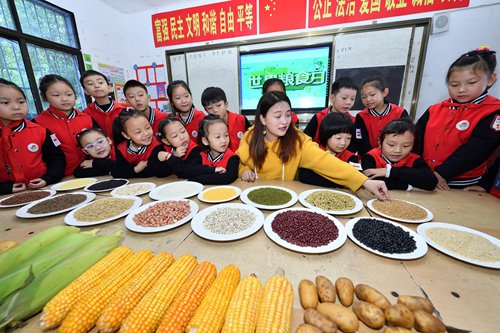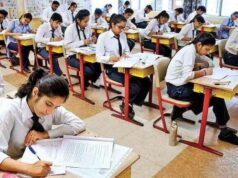Life skills to become part of curriculum for schools in China

A teacher helps primary school students in Baokang county, Central China’s Hubei Province identify different grains. This is part of activities nationwide to raise students’ awareness of protecting food ahead of World Food Day, which falls on Wednesday.
China’s Ministry of Education has issued the Life Skills Curriculum Standards for Compulsory Education (2022 edition), which will be implemented in the fall semester of 2022. The classes will officially become part of the curriculum in primary and secondary schools from September, according to a report from the Xinhua News Agency.
The learning objectives include “organization and storage, household cleaning and cooking.” They have been formulated according to different school stages, according to the curriculum standards.
Primary school students will be required to understand and master the basics of home cooking, from preparing vegetables to finally being able to complete the whole process of home cooking independently.
News that primary and secondary school students will learn cooking from September became one of the top trending topics on Sina Weibo, attracting more than 300 million views.
“This reminds me of my life skills class in primary school. I learned to make dumplings and do simple needlework,” one Weibo user commented. “It’s a super-good memory of my childhood.”
“These will be lifelong skills for these kids, helping them develop into well-rounded individuals, not just students who are able to take exams,” said another netizen.
As part of the “double reduction” policy aiming to reduce homework and time spent on extra-curricular classes or after-school private tutoring, life skills education has become a new highlight of education reform.
A Beijing-based educational expert told the Global Times that education should pay attention to “the progress of individual students” and a change in priority from “the evaluation of results to the process.”
“We should use comprehensive assessment to observe each student’s growth and progress, instead of merely focusing on examinations,” said the expert.



